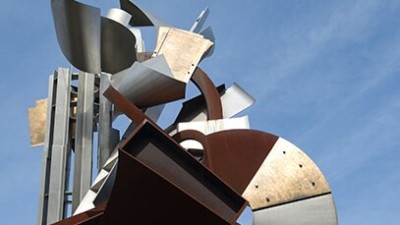News
Linwei Wang
-
June 12, 2023
![seven researchers posing for a photo outside of R I T's clinical health sciences center.]()
RIT and FDA test digital therapy/avatar to treat addiction, reduce intimate partner violence
Researchers from five colleges at RIT are testing a new way to deliver mental health therapy to people struggling with alcohol/drug addiction and aggressive behavior. RIT is running a randomized clinical trial with the Food and Drug Administration to test the therapy platform “RITchCBT” as a tool for treating people whose substance use disorders have led to intimate partner violence.
-
April 29, 2023
![crowd of people walking in between bricks buildings under a sign for Imagine R I T.]()
Imagine RIT festival proves the future is bright
Thousands of visitors at the 2023 Imagine RIT: Creativity and Innovation Festival got to see what’s on the horizon in the areas of technology, the arts, and design. Festivalgoers traversed RIT’s campus on Saturday, exploring more than 350 exhibits.
-
December 6, 2021
![the Vela pulsar, a rapidly rotating neutron star.]()
RIT scientists develop machine learning techniques to shed new light on pulsars
New machine learning techniques developed by scientists at Rochester Institute of Technology are revealing important information about how pulsars—rapidly rotating neutron stars—behave. In a new study published by Monthly Notices of the Royal Astronomical Society, the researchers outlined their new techniques and how they applied to study Vela, the brightest radio pulsar in the sky.
-
August 18, 2021
![person standing in front of a room addressing a group of people.]()
NIH recognizes RIT for enhancing faculty gender diversity in biomedical and behavioral science
The National Institutes of Health has awarded RIT the NIH Prize for Enhancing Faculty Gender Diversity in Biomedical and Behavioral Science. The prize went to 10 institutions that have acted to effect systemic change in gender diversity and equity among faculty members within their biomedical and behavioral science departments, centers, or divisions.
-
July 21, 2021
![professor looking at student's work in a cluster of computers.]()
CAREER Awards advance promising research for future innovators and leaders
NSF Faculty Early Career Development (CAREER) Award winners are among an elite group of research faculty on campus and across the country. CAREER Awards are just one of several indicators of a university’s growing research initiatives, funding sources, and faculty innovation.
-
October 23, 2020
![four researchers posing for photo.]()
Research team wins Catalyst Award in first year of international challenge
David Borkholder, Linwei Wang, Caroline Easton, and Adam Smith, part of RIT's Personalized Healthcare Technology signature research initiative, recently won a Catalyst Award from the National Academy of Medicine for their project, “Improving Health for the Aging through Daily Vital Signs Monitoring.”
-
October 14, 2020
![reseacher posing in lab.]()
RIT, URMC receive grant to study benefits of AI-enabled toilet seat technology
Toilet seats with high-tech sensors might be the non-invasive technology of the future that could help reduce hospital return rates of individuals with heart disease. A joint project by researchers at RIT and the University of Rochester Medical Center will determine if in-home monitoring can successfully record vital signs and reduce risk and costly re-hospitalization rates for people with heart failure. The five-year, $2.9 million venture is funded by the National Institutes of Health.
-
October 9, 2020
![professor in atrium of college.]()
Linwei Wang named new director of RIT’s Personalized Healthcare Technology initiative
Linwei Wang has been named the new director of the Personalized Healthcare Technology signature research initiative at RIT, and Adam Smith has been named Creative Director, a new position with the group.
-
February 14, 2020
![researcher posing in lobby of building.]()
Helping heart surgeons see more clearly
Associate professor Linwei Wang is leading an international group of researchers and clinicians developing computational systems for creating individualized 3D imaging of a patient’s heart. With these 3D heart models, clinicians now have a noninvasive way to study their patients.
-
September 13, 2019
![Gloved hands work on semiconductor wafer.]()
RIT Sponsored Research garners $74 million in funding
RIT had its second best year ever in sponsored research funding and a record year for research expenditures in fiscal year 2019. RIT received 366 new awards totaling $74 million in funding, and expenditures grew to $58 million.
-
July 12, 2019
![Woman wearing black blouse sits in front of desk with computer.]()
Professor honored with Presidential Early Career Award for Scientists and Engineers
RIT computing professor Linwei Wang, whose research is advancing non-invasive personalized healthcare for heart diseases, is receiving the Presidential Early Career Award for Scientists and Engineers, the highest honor bestowed by the U.S. government on outstanding scientists and engineers who are beginning their independent research careers and show exceptional promise for leadership in science and technology.
-
June 21, 2019
![NSF 2026 Idea Machine logo with gears]()
RIT researchers among finalists for National Science Foundation Big Ideas Competition
A team RIT computing professors are finalists in the National Science Foundation 2026 Idea Machine competition for their proposal on Integrated Human-Machine Intelligence, beating out more than 800 other ideas.

















